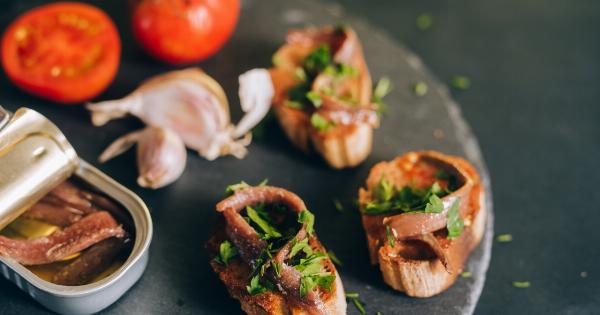During pregnancy, it is crucial to pay attention to your diet and ensure that you are consuming wholesome and nutritious foods that support the growth and development of your baby.
While there are numerous foods that you should include in your diet, there are also certain foods that you should steer clear of. These foods can pose potential risks to the health of you and your baby, and it is best to avoid them during this precious time. Let’s take a closer look at some of the foods you should avoid during pregnancy.
Fish High in Mercury
While fish is generally a healthy choice during pregnancy due to its omega-3 fatty acids and protein content, certain varieties can be high in mercury.
High levels of mercury can lead to developmental issues in your baby’s brain and nervous system. It is recommended to avoid fish such as shark, swordfish, king mackerel, and tilefish, which tend to have higher mercury levels.
Opt for safer alternatives like salmon, trout, and shrimp, which are low in mercury but still offer numerous health benefits.
Raw or Undercooked Eggs
Raw or undercooked eggs can potentially contain harmful bacteria called salmonella, which can lead to food poisoning. This can be harmful not only for you but also for your baby.
Ensure that eggs are thoroughly cooked until both the yolk and white are firm to reduce the risk of contamination. Additionally, be cautious of dishes that may contain raw eggs, such as homemade mayonnaise or certain desserts.
Unpasteurized Dairy Products
Unpasteurized dairy products, including some soft cheeses and milk, can carry a higher risk of bacterial infections such as listeria. Listeria infection during pregnancy can lead to miscarriage, premature birth, or severe illness in the newborn.
It is best to opt for pasteurized dairy products, which have undergone a process that kills harmful bacteria while retaining essential nutrients.
Raw or Undercooked Meats
Similar to raw or undercooked eggs, raw or undercooked meats can also contain harmful bacteria like salmonella, E. coli, or toxoplasma that may cause foodborne illnesses.
It is essential to cook all meats thoroughly, ensuring that they reach the proper internal temperature, to eliminate any potential risks. Avoid deli meats or processed meats unless they have been heated until steaming hot to reduce the risk of listeria.
Caffeine
While it may be difficult to resist that cup of coffee in the morning, it is advisable to limit your caffeine intake during pregnancy.
Too much caffeine can increase your heart rate and blood pressure, and it can also cross the placenta and affect your baby’s heart rate. It is recommended to consume no more than 200 milligrams of caffeine per day, which is roughly equivalent to one 12-ounce cup of coffee. Be mindful of other sources of caffeine such as tea, chocolate, and certain sodas.
Raw Sprouts
Raw sprouts, including alfalfa, clover, mung bean, and radish sprouts, may carry bacteria such as salmonella, E. coli, or listeria. These bacteria can be harmful if consumed during pregnancy.
The sprouting process creates an ideal environment for bacteria growth, making them particularly vulnerable to contamination. It is best to cook sprouts thoroughly to eliminate any potential risks.
Processed Junk Foods
Processed junk foods, such as chips, soda, cookies, and candies, are typically high in added sugars, unhealthy fats, and empty calories. These foods provide little to no nutritional value and can contribute to excessive weight gain during pregnancy.
Additionally, a diet high in processed foods may increase the risk of gestational diabetes and other complications. It is best to focus on whole, nutrient-dense foods to ensure you and your baby receive proper nourishment.
Artificial Sweeteners
Although certain artificial sweeteners, such as aspartame, are considered safe in moderation during pregnancy, it is still advisable to limit their consumption. It is always best to opt for natural sweeteners like honey or maple syrup whenever possible.
Some studies suggest that excessive intake of artificial sweeteners may be associated with adverse effects, such as preterm delivery or increased risk of obesity in the child.
Alcohol
It is well-established that alcohol consumption during pregnancy can have severe consequences on the developing fetus. Drinking alcohol during pregnancy increases the risk of miscarriage, stillbirth, and fetal alcohol spectrum disorders (FASDs).
FASDs can lead to lifelong physical, behavioral, and intellectual disabilities. It is highly recommended to completely abstain from alcohol during pregnancy.
Highly Processed Seafood
While fish can be a healthy part of your pregnancy diet, certain processed seafood products may contain additives, preservatives, and high sodium levels, which can be detrimental to your health.
Examples include fish sticks, fish nuggets, or breaded/fried fish products. Opt for fresh or frozen options instead, which offer more nutritional benefits without the added unhealthy elements.
Conclusion
During pregnancy, maintaining a healthy and balanced diet is of utmost importance for the well-being of both you and your baby.
By avoiding foods that may pose potential risks, such as fish high in mercury, raw or undercooked eggs and meats, unpasteurized dairy products, and processed junk foods, you can help ensure a smooth and healthy pregnancy. Remember to always consult with your healthcare provider for personalized advice and guidelines regarding your specific dietary needs.
























